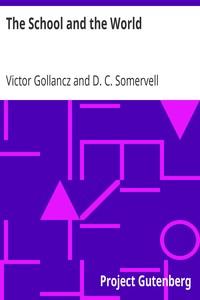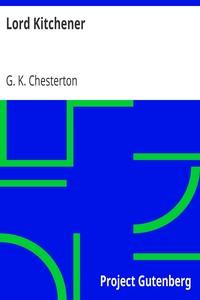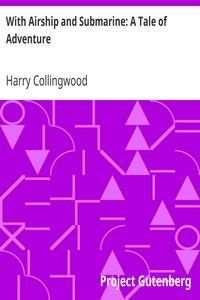|
|
Read this ebook for free! No credit card needed, absolutely nothing to pay.Words: 32872 in 6 pages
This is an ebook sharing website. You can read the uploaded ebooks for free here. No credit cards needed, nothing to pay. If you want to own a digital copy of the ebook, or want to read offline with your favorite ebook-reader, then you can choose to buy and download the ebook.

: The School and the World by Gollancz Victor Somervell D C David Churchill - Endowed public schools (Great Britain); Political science Study and teaching@FreeBooksWed 07 Jun, 2023 CHAP. THE SCHOOL AND THE WORLD THE RISE The school in which political education was tried for a space of something under two years is in no way a very remarkable school. It has its sixteenth-century founder, "of pious memory," and its "second founder," of memory almost more pious, in early Victorian days. That second founder made the school famous as a centre of stalwart evangelicalism. More recently its fame has been won chiefly in the production of first-class cricketers. Until the early years of the present century the school had also, we are told, a kind of inverted fame as one of the "stupidest" of the public schools, as a dumping ground for young hopefuls who could not pass entrance examinations elsewhere. From that reputation, however, it had struggled fairly successfully to free itself. The present writers started with the common assumption that the "Classical" scheme of a liberal education had long broken down in practice, and survived only as feudalism survived in eighteenth-century France, because sufficient energy had not yet generated to create a new scheme to replace it. In part it had already disappeared and given place to the patchwork innovations of the earnest but painfully cautious and conservative reformers who have ruled the schools since the days of Dr. Arnold. The classical system had become the classical compromise, a clipped and truncated classics, fighting a losing battle for air space amidst a crowd of inadequately provided "new subjects"--history, literature, science, modern languages. In some ways the last state was worse than the first. For the first state had at least been based upon a great tradition and an ordered philosophy of life, but in the last state there was no tradition, no ordered philosophy; only a jumble and a scramble, and a passing of examinations. Such a system or lack of system must fall a prey sooner or later to some educational movement based on a coherent and defensible doctrine. Now, as it chances, such a movement is already in the field; we may call it the "Cult of Efficiency." It proclaims a great many truths about the necessity of increasing productivity, about the connection between education and the world of business, and generally speaking points to the achievements of Germany for our envious imitation; it proclaims the commercial utility of Spanish and Russian, and ranges in its advocacy from advanced chemistry to shorthand and book-keeping. Much that writers on these lines have to urge against the present system is perfectly sound and reasonable. Many of their claims will have to be recognised in the educational system of the future. But the admission of their claim as a whole, of the claim of "efficiency" to be the true and rightful heir of the old classical education, would be, to speak without exaggeration, the greatest disaster that could possibly befall this country. What was wanted then was a conception of education at once "liberal" and "modern," and such the writers found in "politics," using that word in its widest Platonic sense. The classical education set out to study the ancient world, and in the case of most of its pupils achieved little more than the dry elements of two dead languages. The study of the modern world has so far usually meant no more than the study of how to make a little money out of it; the trail of commercialism has been drawn over our Modern Sides. Why should not the modern world be studied in the same noble and disinterested spirit as that in which the best of the old teachers studied the world of Greece and Rome? It is surely worthy of such study. Only perhaps by such study in our schools can its wounds be healed. The central subject of a liberal education should be "To-day," the great difficulties amongst which we are all groping, the great problems awaiting solution, the great movements, capitalism and socialism, imperialism and internationalism, freedom and authority, that are battling for mastery or negotiating for a workable compromise. The value of the classics lies wholly in the contribution that classical art, philosophy, and history can make to the enrichment of our minds for the study of our own problems. The value of modern history lies in the inspiration of its great men, and the warning of its tragic experiences. The value of "Divinity" is only found when we face the fundamental question, Are we to apply Christianity in our political and economic relations to-day, or are we not? But over and above this reorientation of subjects already scheduled in the orthodox time-table, there is the new subject within which all these must be regarded as merely contributory, and that subject is "politics," the treatment, elementary yet thorough, vigorous yet many sided, of the great questions of the day, with all the diverse lines of thought along which each can be approached. Here the fundamental "text-book" is the newspaper. Growing up in such a world as this of 1918, how can it be anything but sheer monasticism to divert the main part of a boy's intellectual energies away from this subject to anything else? Our educational "America is here or nowhere." But so far the movement had only touched the sixth form, and in a minor degree such lower forms as the writers happened to meet in the course of their professional duties. That was plainly not enough. If boys are learning from their masters something that they really value, their natures are so essentially communicative and sociable that they will be eager to pass it on to their friends. This may seem a paradox, but it is true enough. If of two boys in constant contact, A is learning algebra and B is not, and if A refrains from talking algebra to B, one of two causes must be the explanation of A's reticence. Either he does not care about B or else he does not care about algebra, and since by hypothesis he cares about B, we can only assume that he does not care about algebra. A simple experiment will verify our conclusion. Drop an indiscretion about a colleague during the algebra lesson, and B, C, D and all the rest of them to a long way beyond Z will know all about it before sunset. A, B, C, and D are interested in masters' opinions of each other. Now we would not claim for a moment that all educational subjects should be required to pass this test of "interest," and rejected if they do not. That would be grotesque. But it seems to us that the central subject of a liberal education, that subject to which all others cohere and in relation to which all others are justified, ought to make some such appeal to enthusiasm. Unless education produces enthusiasm for something, there is no education, and that is why it has so often been maintained that the real education of Public Schools is in the playing fields, because there alone, for most boys, enthusiasm is generated, if it is generated at all. Judged by this test of infectious enthusiasm, political education was to produce in the early months of 1918, evidence of its educational worth such as we never dreamt of, and here again the pioneer was not ourselves but a boy, and that boy not one of the group that had started the paper. This boy, who had recently become head of his House, conceived the idea that politics could become the medium of the same spirit of joyous and unforced co-operation as is traditionally associated with athletics. His idea of a school house was of a vigorous and jolly community, living together on terms of friendly equality such as reduced fagging and the oligarchial "prefect system" to a minimum, and uniting in a real effort to keep abreast with the great world outside by means of a co-operative study of politics and the Press. The idea will seem mere foolishness and an impossibility to many of those who did not see it actually at work. At the best it will seem the kind of thing we may have read of in books about "freak schools," where so much loss has obviously to be set against whatever is gained. In this case, not only the idea, but all the practical details came from the boy himself and the little band of enthusiasts that gathered round him. Indeed, one feels a sense of impropriety in describing what was essentially not our work, but his. However, it was the fine flower of political education, and as such may fitly close this chapter. "Houses," after all, and not "forms," are the natural social units that compose a public school, and a scheme of education that becomes in the best sense popular may, indeed must, take its rise in the classroom, but will find its freest development in the life of house reading-room and house study. The chief among many "stunts," as they were called, was a political society. The twenty-five members of this society, rather over half the house, undertook to read between them nearly all the more important newspapers, including one or two French papers. On Sunday the society sat in conclave, the three or four leading events of the week were taken each in turn, and the individual or group responsible for each newspaper put forward the view of the event in question taken by his own particular organ. These views were compared and debated, and ultimately a brief synopsis was drawn up, consisting of the event itself, with the chief typical utterances of the press on the subject set out underneath, for purposes of comparison and contrast. These were typed and posted on a board as "news of the week." Neither of us ever attended a meeting of this society, and it is obvious, from the fact that more than half the house joined in, that we are not concerned here with the activities of a little set of intellectualists. In the fullest sense in which the word is applicable in a public school, these political activities were "democratic," and the effect on the "English" work of some of the boys in middle forms was most remarkable. The present writer recalls, for instance, a Middle Fifth essay of some three thousand words on the complex, and in some ways repellent, subject of "National Guilds." On how many successive nights the rule against "sitting up" was broken over the composition of this work the recipient of the essay forebore to inquire. From this beginning other developments rapidly opened. A modest but useful idea was a question paper, on which any one who liked could set down questions that occurred to him in the course of his reading. The House Library naturally felt the impact of the movement, and a political section was started in which books about the Greeks and Mill's "Liberty" stood side by side with the latest essay on "Reconstruction." But it would be giving an altogether unworthy notion of the movement if it were suggested that politics alone, in the narrower sense, marked the limit of these activities. The best modern plays and poetry began to appear on shelves whence rubbishy novels of a past generation were removed to make room for them. Nor were older books neglected. The general drift of interest was inevitably towards the moderns; but the great poets of the past were also finding their way in before the end came. Free books android app tbrJar TBR JAR Read Free books online gutenberg More posts by @FreeBooks
: Blicke in das Leben der Zigeuner Von einem Zigeuner by Wittich Engelbert - Romanies DE Sachbuch@FreeBooksWed 07 Jun, 2023

: Lord Kitchener by Chesterton G K Gilbert Keith - Kitchener Horatio Herbert Kitchener Earl 1850-1916@FreeBooksWed 07 Jun, 2023
|
Terms of Use Stock Market News! © gutenberg.org.in2025 All Rights reserved.






